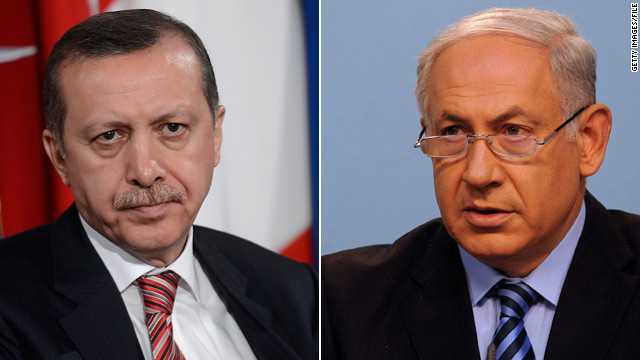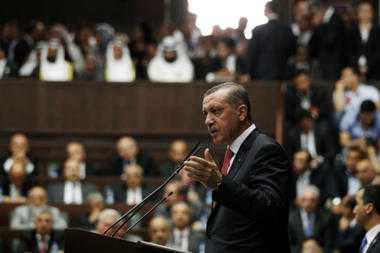Turkey, Israel: Potential for a fresh start?
Editor’s Note: Soner Cagaptay is a senior fellow at the Washington Institute for Near East Policy and a GPS contributor. You can find all his blog posts here. Tyler Evans is a research assistant at the Washington Institute for Near East Policy. The views expressed in this article are solely those of Soner Cagaptay and Tyler Evans.

By Soner Cagaptay and Tyler Evans, Special to CNN
Soner Cagaptay
Thursday marks the two-year anniversary of the 2010 flotilla incident, a crisis on the high seas that triggered a tailspin in Turkish-Israeli relations.
In the aftermath of the incident, Turkey recalled its ambassador and demanded an apology from Israel as well as reparations for the nine slain activists. Ankara even announced that its warships would escort future missions to Gaza.
Attempts to mend fences have stalled over the issue of an Israeli apology. With Turkey willing to accept nothing less than a full apology, and Israel for the moment unwilling to accommodate this demand, the two sides seem to be at an impasse.
Yet below the surface, not all is grim in Turkish-Israeli relations. Remarkably, economic ties have been flourishing between the two countries.
Turkish-Israeli economic ties took off in the late-1990s as part of a growing strategic convergence. Deepening trade was underpinned by a series of bilateral agreements opening Turkish and Israeli markets to each other. Notable agreements included a free trade agreement (1996), a double-taxation prevention treaty (1997), and a bilateral investment treaty (1998). These agreements ushered in an era of improving political and economic ties. Trade jumped from $449 million in 1996 to more than $2.1 billion in 2002. This remarkable acceleration continued with bilateral trade increasing 14.6% per year, on average, from 2002 to 2008.
Surprisingly, the diplomatic crisis has not translated into an economic crisis. Take for instance, a boycott announced by several Israeli grocery chains in the wake of the flotilla incident. Despite the assertions on the part of these retailers, Turkish export of vegetable products has remained steady since 2007, and exports of prepared foodstuffs, beverages and tobacco doubled between 2007 and 2011. From 2010 to 2011, trade increased by 30.7%, far surpassing the growth that occurred during the heyday of Turkish-Israeli ties.
Still, defense ties have been hard-hit. Following the flotilla incident, Turkey froze at least a dozen defense projects with Israel, including a $5 billion deal for tanks and an $800 million sale for patrol aircraft and an early-warning radar plane.
Despite these bruises, economic ties seem destined to deepen even further in the long term.
For starters, all the aforementioned trade and investment treaties remain solidly in effect. Secondly, neither side seems eager to disrupt the trend of booming bilateral trade. In the aftermath of the flotilla incident, Turkish Prime Minister Recep Tayyip Erdogan announced his intention to cut all relations with Israel, including trade. But Ankara rapidly corrected the statement, adding that commercial ties would not be downgraded. Similarly, when an Israeli investment house announced its plans to divest in Turkey, the head of the Israeli Chamber of Commerce urged firms to refrain from any actions that might hurt Turkish-Israeli business ties.
Q&A: Explaining the tension between Turkey, Israel
The mutual reluctance to rupture trade ties is understandable, especially in light of the global economic climate. After all, both countries owe much of their growth in recent years to buoyant exports, a large portion of which were sold in European markets. This means that both countries are vulnerable to a sluggish European recovery. Greater bilateral trade could pick up some of the slack, especially on the Israeli side, where Turkey constituted Israel’s sixth-largest export market in 2011 and could climb the ranks as Israel’s traditional markets remain anemic.
Israel is important for Turkey as well. In terms of volume, the Israeli market is small, but it presents significant opportunities for Turkish producers to move up the value chain. In March, the Turkish Industry and Business Association identified Israel as a priority investment partner, underlining the advantages of coupling Turkey’s land and labor with Israel’s innovation economy. A telling example of this potential can be found in Bursa, where Turkish manufacturers are assembling electric cars as part of a venture with the Israeli company Better Place. Thanks to this venture, Turkey is now producing its first electric car with technology that would not have been easy for the Turks to develop on their own.
There is also a political angle that could bode well for bilateral ties. Faced with an increasingly volatile Middle East, some Israelis are concluding that they are better off rebuilding ties with Turkey, even if this does not mean going back to the honeymoon years of the 1990s. Meanwhile, Turkey faces a popular uprising in Syria that holds the potential of spilling over its borders. Along with downward-spiraling ties with Iraq, not to mention regional competition against Iran, this suggests that Israel is perhaps not the biggest fish to fry.
Turkey and Israel seem to have potential for a fresh start. Even if the pair continues to diverge on certain core political issues, both seem to secretly prepare for the day they can make up again. As always, the flag follows the money.
The views expressed in this article are solely those of Soner Cagaptay and Tyler Evans.
Post by: Soner Cagaptay
via Turkey, Israel: Potential for a fresh start? – Global Public Square – CNN.com Blogs.






